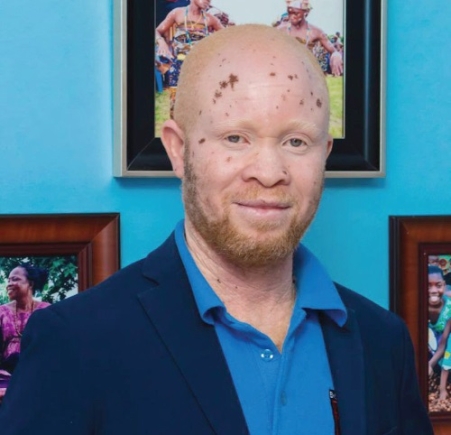An Advocate for persons with albinism has called for urgent legal and health policy reforms to safeguard the lives of persons living with the condition in the country.
The Albinism Programme Coordinator at humanitarian NGO Engage Now Africa, Kwame Andrews Daklo warned that the continued lack of legal recognition and healthcare support was putting their lives at risk, especially through the preventable threat of skin cancer.
He further stated that the government’s failure to provide free or subsidised access to sunscreen, skin screening, and cancer treatment is contributing to needless suffering and premature deaths, describing it as a violation of their rights.
“You say right to life or a violation of any rights of a person that leads to any harm that can lead to death — it’s a violation to the right to life. So if government is unable to protect persons with albinism from skin cancer, which kills, they are just going to rot and die. Sorry to say that, but that is the reality,” he said.
Albinism Awareness Day
Mr Daklo was speaking to the Daily Graphic to mark the 2025 International Albinism Awareness Day (IAAD) which is observed annually on June 13 to celebrate the human rights of persons with albinism worldwide.
This year’s theme, “Demanding our rights, protect our skin, preserve our lives,” highlights the urgent need for healthcare access, legal reform, and public protection for persons with the condition.
Mr Daklo stressed that skin cancer — not ritual attacks — was the leading cause of death among persons with albinism, with some studies suggesting that 90 per cent die of the disease before the age of 40 adding that the country’s health system is ill-equipped to handle their needs.
Mr Daklo therefore, called for sunscreens to be made readily available in hospitals and pharmacies as well regular skin screening and cancer treatment to be covered under the National Health Insurance Scheme (NHIS).
Without these provisions, he warned, people are left exposed to harmful sunlight due to survival needs, cannot afford treatment, and ultimately die.
Legal reforms, data
Currently, Ghana's Persons with Disability Act, 2006 (Act715) does not explicitly list albinism as a separate category, but broadly covers it.
This is because it includes any physical, mental or sensory impairment and social barriers such as stigma, which is often associated with albinism.
Mr Daklo advocated for legal reforms that would formally and categorically recognise albinism as a disability under the legislation to provide adequate access to healthcare for persons with the condition and give legal backing to social and health interventions.
To help this materialise, he called for increased data collection by bodies such as the Ghana Statistical Service (GSS) on persons with albinism to address the significant gap in the country’s recognition and documentation of the condition.
Without accurate data, Mr Daklo argued that the government could not plan or allocate resources effectively, which perpetuated the systemic neglect of persons with albinism across the country.
“If you know that this number of people exist in your country, with this particular intervention, they need this particular care, then that's when you make policies for them,” he said pointing out that other African countries, including Kenya, Tanzania, Malawi, and Sierra Leone, had managed to collect such data.
Encouragement
Mr Daklo encouraged his fellow persons with albinism to take proactive steps to protect themselves while continuing to pursue their goals in life.
He advised them to avoid direct sun exposure whenever possible and to wear long-sleeved and protective clothing when outdoors.
He stressed the importance of using sunscreen, especially on exposed parts of the body like the face and neck, where skin cancer tends to develop.
At the same time, he urged his peers not to let stigma or discrimination deter them from participating in society.
Instead of withdrawing, he encouraged them to hold their heads high, walk boldly, and engage confidently in work and life.

